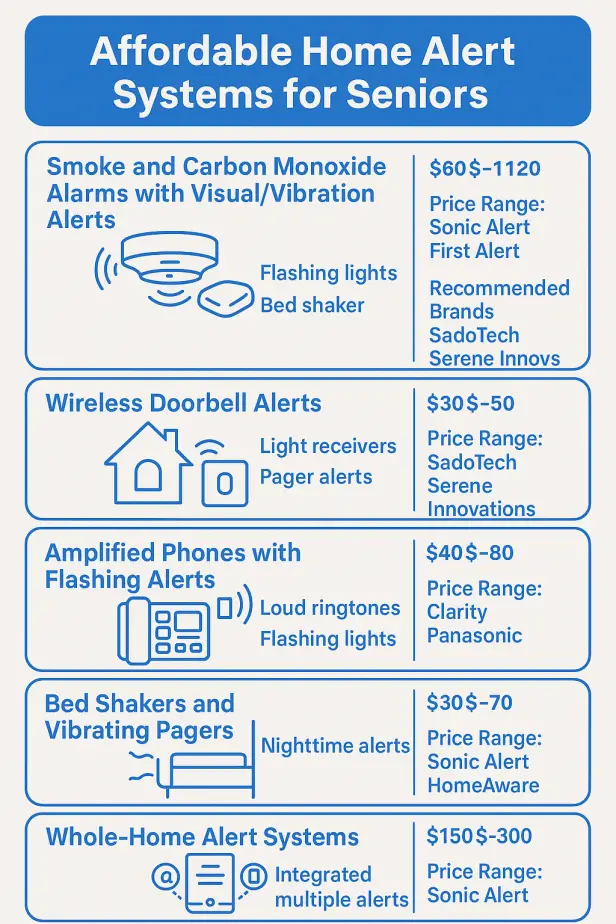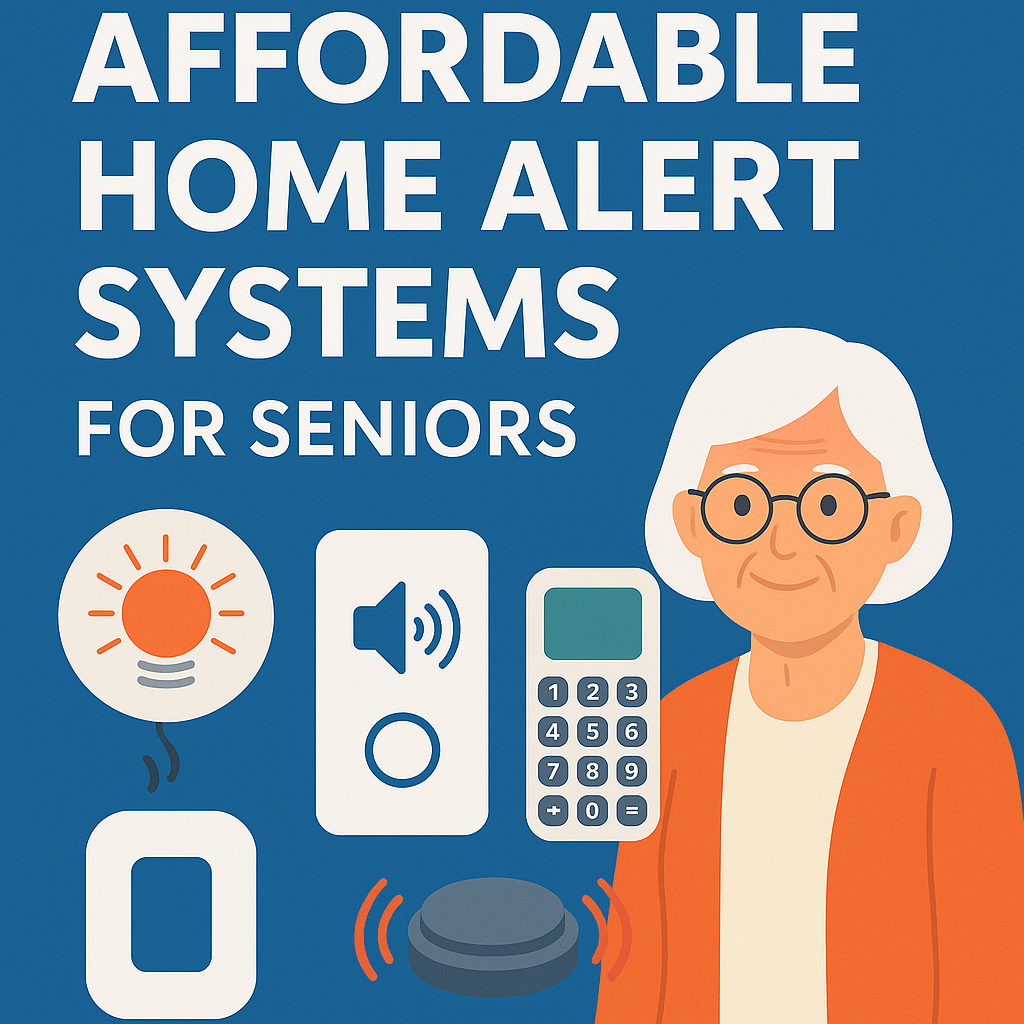Aging at home is becoming the preferred choice for millions of seniors — but safety concerns remain a major barrier. Missed doorbells, unheard alarms, or unnoticed phone calls can quickly become stressful or even dangerous. For seniors with hearing loss, the challenge is even greater.
The solution? Affordable home alert systems designed specifically for older adults. These systems use flashing lights, vibrations, and loud customizable alarms to make sure nothing important gets missed.
In this comprehensive guide, we’ll cover the best and most affordable alert devices for seniors, highlight trusted brands, explain how they differ from “medical alert services” like Life Alert, and show you how to choose the right system for your home.

Why Seniors Need Alert Systems
As an audiologist who has worked with older adults for over a decade, I’ve seen firsthand how traditional alarms fail those with hearing loss. Standard smoke detectors or doorbells rely on sound — often in higher frequencies — which are the very tones most seniors struggle to hear.
Without the right alert system, seniors may:
- Sleep through a smoke alarm.
- Miss a visitor or delivery.
- Fail to notice an urgent phone call.
- Feel isolated and unsafe in their own homes.
Home alert systems replace uncertainty with peace of mind. They also reduce caregiver stress, since family members know their loved one will be alerted in case of danger.
Alert Systems vs. Medical Alert Services
A quick clarification:
- Home alert systems = Devices that make seniors aware of events in the home (doorbells, alarms, phones). These are one-time purchases.
- Medical alert services = Subscription-based systems with fall detection and emergency call buttons (e.g., Life Alert, Medical Guardian).
Both are valuable, but in this article, we focus on affordable home alert devices that improve day-to-day safety for seniors with hearing loss.
Best Affordable Alert Systems for Seniors
Here are the most effective — and budget-friendly — categories of alert systems available in 2025:
1. Smoke and Carbon Monoxide Alarms with Visual/Vibration Alerts
Price Range: $60–$120
Traditional smoke alarms cost under $20, but seniors with hearing loss need models that include flashing strobe lights and bed shakers. These devices wake you up even if you’ve removed hearing aids at night.
Recommended Options:
Pro Tip: Always choose UL-certified alarms for reliability.
2. Wireless Doorbell and Visitor Alerts
Price Range: $30–$50
Missed visitors are one of the most common complaints among seniors with hearing loss. Wireless doorbells with flashing receivers or vibrating pagers make sure you never miss someone at the door.
Recommended Options:
👉 Want more smart solutions? See Smart Home Tech for People Who Don’t Hear Doorbells or Alarms.
3. Amplified Phones with Flashing Alerts
Price Range: $40–$80
Phones are lifelines for seniors, but standard ringtones can be easy to miss. Amplified phones feature extra-loud ringers (50+ dB) plus flashing light indicators.
Recommended Options:
For advanced accessibility, captioned phones like CaptionCall provide real-time text of conversations — many seniors qualify at no cost.
4. Bed Shakers and Vibrating Pagers
Price Range: $30–$70
When seniors remove hearing aids at night, they become especially vulnerable. Bed shakers — small vibrating devices placed under pillows or mattresses — connect to alarms, doorbells, and baby monitors to provide nighttime security.
Recommended Options:
These are especially popular among seniors who live alone.
5. Whole-Home Alert Systems
Price Range: $150–$300
If you want all alerts (smoke, doorbell, phone, alarms) to work together, a whole-home alert system is the most cost-effective option.
Recommended Options:
These systems are modular, so you can start small and expand as needed.
Comparison Table: Affordable Alert Systems
| Alert System Type | Price Range | Best For | Recommended Brands |
|---|---|---|---|
| Smoke/CO Detectors with Strobes | $60–$120 | Nighttime safety | Sonic Alert, First Alert |
| Wireless Doorbell Alerts | $30–$50 | Visitors/Deliveries | SadoTech, Serene Innovations |
| Amplified Phones | $40–$80 | Phone calls | Clarity, Panasonic |
| Bed Shakers | $30–$70 | Night alerts | Sonic Bomb, HomeAware |
| Whole-Home Kits | $150–$300 | Complete coverage | Sonic Alert, Silent Call |
Cost-Saving Tips for Seniors
- Check local programs. Some state agencies and nonprofits provide free or discounted devices for seniors with hearing loss.
- Ask your audiologist. Many know about assistive technology funding programs.
- Look for bundles. Buying a complete kit is often cheaper than separate devices.
- Shop Amazon discounts. See Amazon’s alert system listings.
FAQs About Home Alert Systems for Seniors
Q: What is the cheapest alert system for seniors with hearing loss?
A: Wireless doorbell flashers and bed shakers, starting around $30.
Q: Do I need both a strobe smoke alarm and a bed shaker?
A: Yes — strobes work well in daylight, but bed shakers are critical at night when hearing aids are removed.
Q: Are these the same as Life Alert?
A: No. Life Alert is a subscription-based medical alert service. Home alert devices are one-time purchases.
Q: Will Medicare or insurance cover alert systems?
A: Typically no, but local or state programs may provide assistance.
Final Thoughts
Affordable alert systems are one of the best investments for senior safety and independence. Whether you start small with a wireless doorbell flasher or invest in a whole-home kit, these devices ensure that seniors with hearing loss never miss a critical alarm, phone call, or visitor.
For a broader look at improving safety, see Making Your Home More Hearing-Friendly, or check our guide to Easy Home Upgrades for Better Accessibility.

